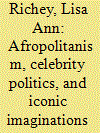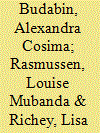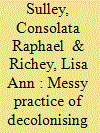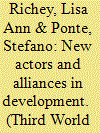|
|
|
Sort Order |
|
|
|
Items / Page
|
|
|
|
|
|
|
| Srl | Item |
| 1 |
ID:
159210


|
|
|
|
|
| Summary/Abstract |
‘Afropolitanism’ has become a disputed term referring to diverse engagements by Africans who are typically members of the cultural elite and participate in diaspora politics, online activism, fashion and literature debates. Simultaneously, in discussions of development aid, celebrity has become a way of mediating between proximity and distance in imagining relationships between South and North. Afropolitanism can be usefully considered as an Africa-specific, post-colonial form of cosmopolitanism that spans discourses of elite pan-African culture to theories of elite global aid culture. We argue that there are essential connections between the rise of Afropolitanism and the celebritization of North–South relations. In this realm, ‘Afropolitanism’ is an idea combining cosmopolitanism’s notions of kindness to strangers in a world where the ‘kindness’ is aid and the ‘strangers’ are Africans. We analyse two archetypical Afropolitan performances by Danish aid celebrities to argue that their representations of Africa’s external relations are theoretically more interesting, and politically more dangerous, than is currently understood. In doing so, we expand the debates around Afropolitanism and celebritization from the realm of cultural politics to one of International Relations.
|
|
|
|
|
|
|
|
|
|
|
|
|
|
|
|
| 2 |
ID:
082012


|
|
|
|
|
| Publication |
2008.
|
| Summary/Abstract |
Bono's launch of Product (red)™ at Davos in 2006 opens a new frontier for development aid. With the engagement of companies such as American Express, Converse, Gap and Emporio Armani, and now Hallmark, Dell and Microsoft, consumers can help hiv/aids patients in Africa. Aid celebrities-Bono, Jeffrey Sachs and Paul Farmer-guarantee the 'cool quotient', the management and the target of this new modality of aid. red functions using the guarantee of celebrity together with the negotiated representation of a distant 'Africa' to meet competing, and perhaps incommensurable, objectives. A 'rock man's burden'-imagined along familiar constructions of sex, gender, race and place-frames African beneficiaries' receiving process. At the same time, red depicts consumer-citizens as fashion-conscious yet actively engaged and ethically reflexive. red rescues international aid from its dour predictive graphs and disappointing 'lessons learnt' and spins it as young, chic and possible. By masking the social and environmental relations of trade and production that underpin poverty, inequality and disease, red reconfigures the world of possibility in what might otherwise be rationally impossible ways.
|
|
|
|
|
|
|
|
|
|
|
|
|
|
|
|
| 3 |
ID:
086012


|
|
|
|
|
| Publication |
2009.
|
| Summary/Abstract |
The Product (RED) initiative was launched by Bono at Davos in 2006. Product RED is 'a brand created to raise awareness and money for the Global Fund to Fight AIDS, Tuberculosis and Malaria by teaming up with iconic brands to produce RED-branded products'. With the engagement of American Express, Apple, Converse, Gap, Emporio Armani, Hallmark and Motorola, consumers can help HIV/AIDS patients in Africa. They can do so simply by shopping, as a percentage of profits from Product (RED) lines goes to support the Global Fund. In this article we examine how the corporations that are part of this initiative use RED to build up their brand profiles, sell products and/or portray themselves as both 'caring' and 'cool'. We also show that, more than simply being another example of cause-related marketing (like the pink ribbon campaign or the ubiquitous plastic armbands), RED engages corporations in profitable 'helping' while simultaneously pushing the agenda of corporate social responsibility (CSR) towards solving the problems of 'distant others'
|
|
|
|
|
|
|
|
|
|
|
|
|
|
|
|
| 4 |
ID:
128463


|
|
|
|
|
| Publication |
2014.
|
| Summary/Abstract |
Consumers, partnering with corporations and celebrities, are forming new alliances in international development through what we call 'Brand Aid' initiatives. At a time of shifting relationships between public and private aid, commodities are sold as the means of achieving development for recipients and good feelings for consumers simultaneously. In this article we first formalise our conceptual model of Brand Aid at the triple interface of causes, branded products and celebrities. Then we conduct a systematic empirical analysis of contemporary Brand Aid initiatives, including three in-depth case studies of 'Win One Give One', toms shoes and Product (red). We argue that these not only use imaginaries of development to sell products to Northern consumers but also engage in the work of a 'story factory' - producing truths about international development and consumer engagement that make development appear simplified, manageable and marketable. We conclude that, in Brand Aid, the problems themselves and the people who experience them are branded and marketed to Western consumers (through celebritised multimedia story-telling) just as effectively as the products that will 'save' them.
|
|
|
|
|
|
|
|
|
|
|
|
|
|
|
|
| 5 |
ID:
171349


|
|
|
|
|
| Summary/Abstract |
Celebrity humanitarianism has been transformed in its scope, scale, and organization in the last thirty years. Its flourishing has generated considerable academic interest from a wide variety of disciplines that share two characteristics. First, these studies are—unusually—well connected, which means that different disciplines have not tended to develop their own separate literatures, but learn from each other’s approaches. This makes it useful and important to identify ways different disciplinary approaches can complement each other. Second, most of this attention has focused on politics of celebrity humanitarianism in the global North. Yet focusing also on the South and on North/South relations will move the field forward. We argue that celebrity humanitarianism must be interpreted through the broader systems of which it is a part. We offer a heuristic typology of celebrity humanitarianism that continues to bridge between different disciplines and which identifies ways in which political science can complement existing studies. We also use this typology to refocus work on the politics of celebrity humanitarian relations away from merely Northern politics. This approach allows us to identify what sorts of politics and political solutions are being advocated by current forms of celebrity humanitarianism.
|
|
|
|
|
|
|
|
|
|
|
|
|
|
|
|
| 6 |
ID:
154471


|
|
|
|
|
| Summary/Abstract |
The past decade has seen a frontier open up in international development engagement with the entrance of new actors such as celebrity-led organisations. We explore how such organisations earn legitimacy with a focus on Madonna’s Raising Malawi and Ben Affleck’s Eastern Congo Initiative. The study draws from organisational materials, interviews, mainstream news coverage, and the texts of the celebrities themselves to investigate the construction of authenticity, credibility, and accountability. We find these organisations earn legitimacy and flourish rapidly amid supportive elite networks for funding, endorsements, and expertise. We argue that the ways in which celebrity-led organisations establish themselves as legitimate development actors illustrate broader dynamics of the machinery of development.
|
|
|
|
|
|
|
|
|
|
|
|
|
|
|
|
| 7 |
ID:
192312


|
|
|
|
|
| Summary/Abstract |
This article1 explores the messy practice of decolonising a concept through collaborative work between scholars researching together the meaning of everyday humanitarianism in Tanzania. Humanitarianism is typically understood as the state-centric, formal, Northern-driven helping of distant others in crisis. Using the concept of everyday humanitarianism, our article challenges these assumptions in three ways. First, it explores the everyday humanitarian actions of ordinary citizens in times of crisis. Second, it explores these responses in a Southern context. Third, it focuses explicitly on the givers and not only the receivers of humanitarian help. Our work grounds decolonisation in the actual practices of research aimed at theory building as an iterative back-and-forth exchange with particular attention to power, rather than as a transplant of Northern theory on the South, or its opposite. Our first argument is that the objective of collaborative research to capture the local politics of giving and then use these practices to interrogate the theoretical concept of everyday humanitarianism can be decolonising. Second, we argue that the practices of the academic labour that produces knowledge or inductive theory can also be decolonising. Understanding both the challenges and the possibilities of decolonising ‘humanitarianism’ will provide an opportunity to document and thus legitimate the complexity that is inherent in decolonising a discipline.
|
|
|
|
|
|
|
|
|
|
|
|
|
|
|
|
| 8 |
ID:
128460


|
|
|
|
|
| Publication |
2014.
|
| Summary/Abstract |
New actors and alliances in development' brings together an interdisciplinary group of scholars exploring how development financing and interventions are being shaped by a wider and more complex platform of actors than usually considered in the existing literature. The contributors also trace a changing set of key relations and alliances in development - those between business and consumers; ngos and celebrities; philanthropic organisations and the state; diaspora groups and transnational advocacy networks; ruling elites and productive capitalists; and 'new donors' and developing country governments. Despite the diversity of these actors and alliances, several commonalities arise: they are often based on hybrid transnationalism and diffuse notions of development responsibility; rather than being new per se, they are newly being studied as practices that are now coming to be understood as 'development'; and they are limited in their ability to act as agents of development by their lack of accountability or pro-poor commitment. The articles in this collection point to images and representations as increasingly important in development 'branding' and suggest fruitful new ground for critical development studies.
|
|
|
|
|
|
|
|
|
|
|
|
|
|
|
|
|
|
|
|
|